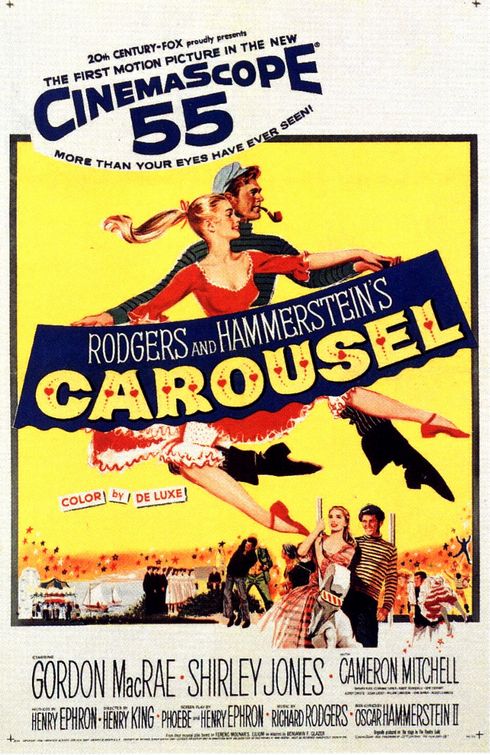Pas de biographie disponible.
Compositeur Musique additionelle Librettiste Parolier Metteur en scène Chorégraphe Producteur création Producteur version

Version 1
Carousel (1956-02-Film)
Type de série: FilmThéâtre: *** Film (*** - ***) Durée : Nombre : Première Preview : Thursday 16 February 1956Première : Thursday 16 February 1956Dernière : Thursday 16 February 1956Mise en scène : Henry King • Chorégraphie : Producteur : Avec : Gordon MacRae (Billy Bigelow), Shirley Jones (Julie Jordan), Cameron Mitchell (Jigger Craigin), Barbara Ruick (Carrie Pipperidge), Claramae Turner (Cousin Nettie), Robert Rounseville (Mr. Enoch Snow), Gene Lockhart (Starkeeper / Dr. Selden), Audrey Christie (Mrs. Mullin), Susan Luckey (Louise Bigelow), William LeMassena (Heavenly Friend (as William Le Massena)), John Dehner (Mr. Bascombe), Jacques d'Amboise (Louise's 'Starlight Carnival' Dancing Partner (as Jacques D'Amboise)), Walter Bacon (Graduation Spectator (uncredited)), Robert Banas (Ruffian in Louise's Ballet (uncredited)), Tex Brodus (Townsman (uncredited)), Buddy Bryan (Dancer (uncredited)), Harry Carter (Third Policeman (uncredited)), Robert Cole (Man at Clambake (uncredited)), Fred Curt (Dancer (uncredited)), Drusilla Davis (Girl at Clambake (uncredited)), Richard Deacon (First Policeman (uncredited)), Marion Dempsey (Sword Swallower (uncredited)), Harrison Dowd (Clem (uncredited)), Meurisse Duree (Dancer (uncredited)), Ward Ellis (Dancer (uncredited)), Bill Foster (Man at Clambake / Dancer (uncredited)), Robert Foulk (Second Policeman (uncredited)), Lili Gentle (Young Girl #1 (uncredited)), Jerry Glenn (Dancer (uncredited)), Cheryl Holdridge (Young Girl #2 (uncredited)), Larry Johns (School Principal (uncredited)), Harry C. Johnson (Juggler (uncredited)), Tor Johnson (Strong Man (uncredited)), Bambi Linn (Dancer (uncredited)), Charles Morton (Graduation Spectator (uncredited)), Edward Mundy (Fire Eater (uncredited)), Mary Orozco (Fat Woman (uncredited)), Dee Pollock (Enoch Snow Jr. (uncredited)), John Rice (Graduation Spectator (uncredited)), Angelo Rossitto (Midget (uncredited)), William Sharon (Policeman (uncredited)), John Smolko (Dancer (uncredited)), Sylvia Stanton (Contortionist (uncredited)), Dolores Starr (Snow's Daughter (uncredited)), Frank Tweddell (Capt. Watson (uncredited))Commentaires longs: The film followed the stage musical faithfully, except for five major changes:
In the film, Billy dies by accident, rather than by suicide as in the show – when he falls on his own knife while trying to escape arrest.
# The "recitative" singing in the "bench scene", leading directly into the song "If I Loved You", is turned into spoken dialogue.
# The "recitative" singing that leads directly into the song "June Is Bustin' Out All Over" is eliminated.
# The film begins in 1888, with Billy having been dead for fifteen years, and the story of his life on Earth is made into a flashback that takes up three-quarters of the film. Billy tells his own story to the Starkeeper in order to receive permission to return to Earth for one day. This last change was made to safeguard against the movie audience's being surprised at the death of Billy, and to prevent their leaving directly after it happens lest they think the story ended at that point.
# In the film, there is no specific mention of the fact that Billy must return to Earth for one day and perform a good deed in order to win entry into Heaven, as there is in the play. In the film's opening scene (a pre-credits sequence), a Heavenly Friend advises Billy that "there's trouble...down on Earth", in case he should like to return there. Billy takes the friend up on the offer, but the film gives the impression that he is not doing it specifically to be admitted into Heaven.
A smaller, less important change was the switching of the song "When The Children Are Asleep" to a later moment in order to take full advantage of the Maine locale. In the film, it is sung in a new scene by Carrie and Mr. Snow in their boat as the couple, together with Julie and Billy, sail to the island for the clambake. (This would logically place the song between Acts I and II of the stage version.) In the stage version, the song is unheard by any of the other characters, but the film places it so that Julie and Billy are there to listen to the song, and to lend a sharp contrast to the happiness that Mr. Snow feels in comparison to Billy's obvious uneasiness about the robbery that he and Jigger are soon to commit.